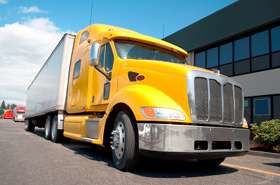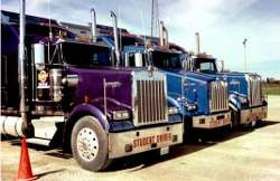Flatbed Opinion?
Topic 14688 | Page 1

Hey JK there are several flatbed drivers on here that will likely check in with you when they read this and have a chance to reply.
Good luck.

Pretty much any company you hire on with will do some form of flatbed training on things like load securement, tarping, etc. I wouldn't worry too much about that. You'll learn enough to get started, then when the inevitable questions arise you can ask always come and ask us!
I can only think of a few major companies with flatbed divisions: Melton, System and TMC come to mind, but there are many more. And of course I have to give a big shout out to my company Jones Bros! Anyway, I would recommend picking up one of those little trucking job ad magazines they have at most truck stops and starting there.
Oh and just make sure you give your current employer plenty of notice and leave on good terms, and there shouldn't be any problems.
Good luck!
what do you folks think would be the best way to transition from reefer to flatbed. My company does zero flatbed.i have always been more interested in flatbed but my current company suited my needs when I got my Cdl. They have been great! Flexible, pay well, decent home time. But every time I see one go by something says "man, that should be you" I know it's a totally different trade all together. What are some of the best companies, schools, classes, or courses to learn flatbedding??? And how long should training take to be able to do it solo?? I have been driving with 1 company for almost 5 years, multiple stops in nyc and Boston weekly, with a sleeper truck and 53 trailer. Driving the truck shouldn't be the problem, Just nervous about jumping ship....
CDL:
Commercial Driver's License (CDL)
A CDL is required to drive any of the following vehicles:
- Any combination of vehicles with a gross combined weight rating (GCWR) of 26,001 or more pounds, providing the gross vehicle weight rating (GVWR) of the vehicle being towed is in excess of 10,000 pounds.
- Any single vehicle with a GVWR of 26,001 or more pounds, or any such vehicle towing another not in excess of 10,000 pounds.
- Any vehicle, regardless of size, designed to transport 16 or more persons, including the driver.
- Any vehicle required by federal regulations to be placarded while transporting hazardous materials.
Reefer:
A refrigerated trailer.
HOS:
Hours Of Service
HOS refers to the logbook hours of service regulations.
I just made the jump from reefer to flatbed. The company I went with had 3 days of flatbed training and then We were sent out on are own. Something I have found out is flatbed drives are quite a bit more friendly then most other drivers and if ask them a question, they usually will show you how to do something. You just need comensense and put your pride aside to ask questions. It's terrifying at first but gets easier with each load. Good luck
Reefer:
A refrigerated trailer.
JK-47, Welcome to the forum!
I agree with the others, just about any flat-bed company that will hire you will also put you through about three days of orientation and load securement classes. We also have an excellent resource for future flat-bedders here in our High Road Training Program. That is a training program for newbies, but if you'll look at it there are some sections in there with a lot of great information for experienced drivers also, and one of those sections is on load securement. Take a look at that - it will put you miles ahead in your understanding of the principles involved.
I like Melton, Boyd Brothers, Jordan, and TMC as far as good places to get started, but you might want to consider some places like Prime, Swift, or Maverick - all three of those companies have flat-bed operations, but they also run reefers. Just in case it turns out that you don't like the new transition, you could easily fall back on what you already know - just an idea.
I have some old threads here in the archives of three different trips that I took my daughters on with me. There's a lot of extra stuff in them just about our time together, but you may enjoy reading them just to see what a flat-bedder's work-week is like. Click on the following links to read them.
CDL:
Commercial Driver's License (CDL)
A CDL is required to drive any of the following vehicles:
- Any combination of vehicles with a gross combined weight rating (GCWR) of 26,001 or more pounds, providing the gross vehicle weight rating (GVWR) of the vehicle being towed is in excess of 10,000 pounds.
- Any single vehicle with a GVWR of 26,001 or more pounds, or any such vehicle towing another not in excess of 10,000 pounds.
- Any vehicle, regardless of size, designed to transport 16 or more persons, including the driver.
- Any vehicle required by federal regulations to be placarded while transporting hazardous materials.
Reefer:
A refrigerated trailer.
HOS:
Hours Of Service
HOS refers to the logbook hours of service regulations.OWI:
Operating While Intoxicated

I went to Primes flatbed division after one year driving reefer food service delivery. They had me go with a trainer for 3.5 weeks and then a flatbed securement class during upgrade prosess to become solo. FYI you pay for all equipment at prime, was about $4000 taken out in weekly payments. I did get over half back when I left as I sold it back to them.
Reefer:
A refrigerated trailer.
Catching up on threads, so this is a late reply. I agree with what the others have said about training for securement, and the fact that most other flatbedders are happy to help out if you have questions about securement at a shipper. (But keep in mind that not all of their advice is good, like some of the unsolicited advice I've gotten about "those middle coils only need one chain" or "you don't need to gut strap that load" (nine layers of structural steel! wtf!?))
There are lots of choices in flatbed companies, but many of the small- to medium-size companies that I run across are rarely mentioned here. The truck stop ad magazines have a lot of flatbed outfits that would love to have a driver with five years driving experience and who will run NE. Securement training isn't that hard unless you have difficulty with math. It takes time to get faster at the job, but not that much time.
And here's the gratuitous plug for my current company, System Transport. They run four or five different regional flatbed operations (mostly West) plus a 48-state operation. They also have sister companies, reefer is TWT, and hazmat tanker operation is called James J. Williams, in case you decide you don't like flatbed. I think they'll send you out with a trainer for a week or two to learn securement, but recruiting would know for sure.
HAZMAT:
Hazardous Materials
Explosive, flammable, poisonous or otherwise potentially dangerous cargo. Large amounts of especially hazardous cargo are required to be placarded under HAZMAT regulations
Shipper:
The customer who is shipping the freight. This is where the driver will pick up a load and then deliver it to the receiver or consignee.
Regional:
Regional Route
Usually refers to a driver hauling freight within one particular region of the country. You might be in the "Southeast Regional Division" or "Midwest Regional". Regional route drivers often get home on the weekends which is one of the main appeals for this type of route.
Reefer:
A refrigerated trailer.
HOS:
Hours Of Service
HOS refers to the logbook hours of service regulations.Maverick here checking in. Since you have experience already I believe you have a week of securemnt class and a day or 2 on tarping. We have instructional videos built into the qualcomm as well as a 24/7 hotline you can call if you forget something. All the other companies mentioned are great choices as well. Best of luck
Qualcomm:
Omnitracs (a.k.a. Qualcomm) is a satellite-based messaging system with built-in GPS capabilities built by Qualcomm. It has a small computer screen and keyboard and is tied into the truck’s computer. It allows trucking companies to track where the driver is at, monitor the truck, and send and receive messages with the driver – similar to email.Don't overlook McElroy Truck Lines. Smaller company, only about 650 trucks, decent pay and home every weekend & they care about their drivers and families. Just recently had a driver that passed away, fellow drivers raised $10,000 in donations for the family and the McElroy family matched it.
New Reply:
New! Check out our help videos for a better understanding of our forum features

















Preview:









 TT On Facebook
TT On Facebook
what do you folks think would be the best way to transition from reefer to flatbed. My company does zero flatbed.i have always been more interested in flatbed but my current company suited my needs when I got my Cdl. They have been great! Flexible, pay well, decent home time. But every time I see one go by something says "man, that should be you" I know it's a totally different trade all together. What are some of the best companies, schools, classes, or courses to learn flatbedding??? And how long should training take to be able to do it solo?? I have been driving with 1 company for almost 5 years, multiple stops in nyc and Boston weekly, with a sleeper truck and 53 trailer. Driving the truck shouldn't be the problem, Just nervous about jumping ship....
CDL:
Commercial Driver's License (CDL)
A CDL is required to drive any of the following vehicles:
Reefer:
A refrigerated trailer.